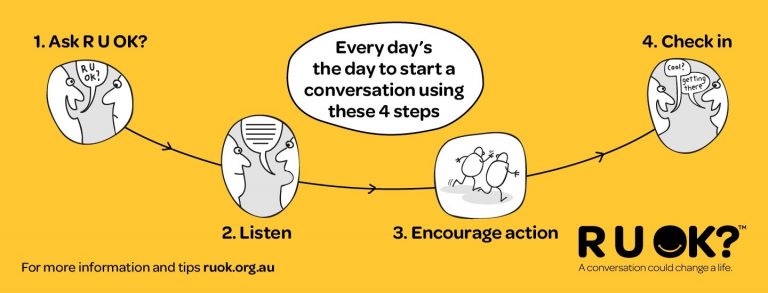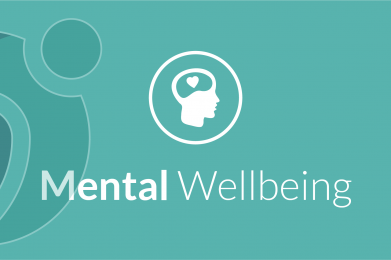How to ask – R U OK?
A conversation can change a life: “No qualifications needed.”

You have what it takes to make a difference. You don’t need to be an expert to ask R U, OK?
Listening and giving someone your time might be just what they need to help them through.
The work of health professionals is vital, and their value cannot be underestimated; however, we can all play a role in supporting the people in our world.
The people in your world won’t always tell you if something’s troubling them, so it’s important that you make asking, ‘are you OK?’ a part of your everyday relationships with friends, family, teammates and colleagues.
The earlier you provide an opportunity for someone to open up to you, the sooner they can find appropriate support or, if needed, seek professional help and the greater the chance that together, you can stop small problems from becoming bigger ones.
Moments you might need to ask include:
- When they’re experiencing relationship difficulties or breaking up with a partner.
- When they’re experiencing increased levels of stress or constant stress.
- When they’re experiencing financial difficulty.
- When they’re going through a period of major change at work, home or in life.
- When they’ve experienced the loss of someone or something they care about.
- When they have a major health issue.
You can use this guide with 4 helpful steps to help you ask “are you okay?”

1. Ask R U OK?
Pick your moment. Start the conversation at a time and in a place where you’ll both be comfortable.
If they can’t talk when you approach them, schedule a time when they can.
Be relaxed and friendly in your approach. Think about how you can ease into the conversation.
If they don’t want to talk, let them know you’ll be there for them when they are ready, or ask if there’s someone else they’d be more comfortable chatting to.
2. Listen with an open mind
Be prepared to listen. Don’t try and solve their problems right away.
Have an open mind.
Don’t rush them, or interrupt. Let them speak in their own time.
Encourage them to explain.
Show you’ve listened by repeating back what you have heard and asking if you have understood them correctly.
3. Encourage action
Once they’ve opened up, encourage them to access support or to do something that might lighten the load.
You don’t have to have the answers or be able to solve their problems, but you can help them consider the next steps and actions they can take to manage their situation.
Some good options might include talking to family, a trusted friend, their doctor or another appropriate health professional.
You can also suggest they think about what’s worked for them or helped when they’ve felt this way or faced similar challenges in the past.
Things that help them relax or bring them joy might include going for a walk, seeing a movie, watching or playing some sport etc.
4. Check in
Remember to check in again soon to see how the person is doing. During the conversation, ask them to suggest a time that’s good for them: “Do you mind if I drop by again soon to see how you’re travelling?”
Ask them how they’re feeling and if they’ve found ways to better manage their situation.
If they haven’t done anything, be encouraging and remind them you’re always there if they need a chat. Remember that for now they might just need someone to lend a listening ear.
Understand that it can sometimes take a long time for someone to be ready to see a health professional. Try to reinforce the benefits of seeking professional help and suggest they try different avenues.
If they’ve had a bad experience with a helpline or doctor, encourage them to keep trying. You could ask, “Would it be useful if we tried some other options to help you get through this?”
Pop a reminder in your diary to drop in or call them in a couple of weeks. If they’re really struggling, follow up with them sooner.
Stay in touch and be there for them. Genuine care and concern can make a real difference.
Worried about their immediate safety?
If you believe someone’s life is in immediate danger, call 000.
If you think someone is having thoughts of suicide, don’t be afraid to ask them if they are – asking the question does not lead to suicide.
And remember, crisis helplines are there for you too. If you find the conversation difficult, call Lifeline on 13 11 14 or the Suicide Call Back Service on 1300 659 467, which will provide immediate support and advice.
If you are personally finding life tough, or find that these conversations have brought up anything for you, or need some extra support, it can help to talk about how you’re feeling with someone you trust.
You and your loved ones can find support by contacting your local doctor or Lifeline:
Lifeline (24/7): 13 11 14 – Lifeline.org.au
View our directory of national helplines and services at ruok.org.au/findhelp
As a Springmount Employee, you can also contact EAP Assist to request up to three hours of free telephone counselling by using Springmount Services’ dedicated Helpline number: 0407 086 000.
Additionally you can find more resources on mental wellbeing and finding help by checking out the Mental Wellbeing page.
Notes
Conversation guide provided by ruok.org.au – download the complete conversation guide and check out their website for more resources.



